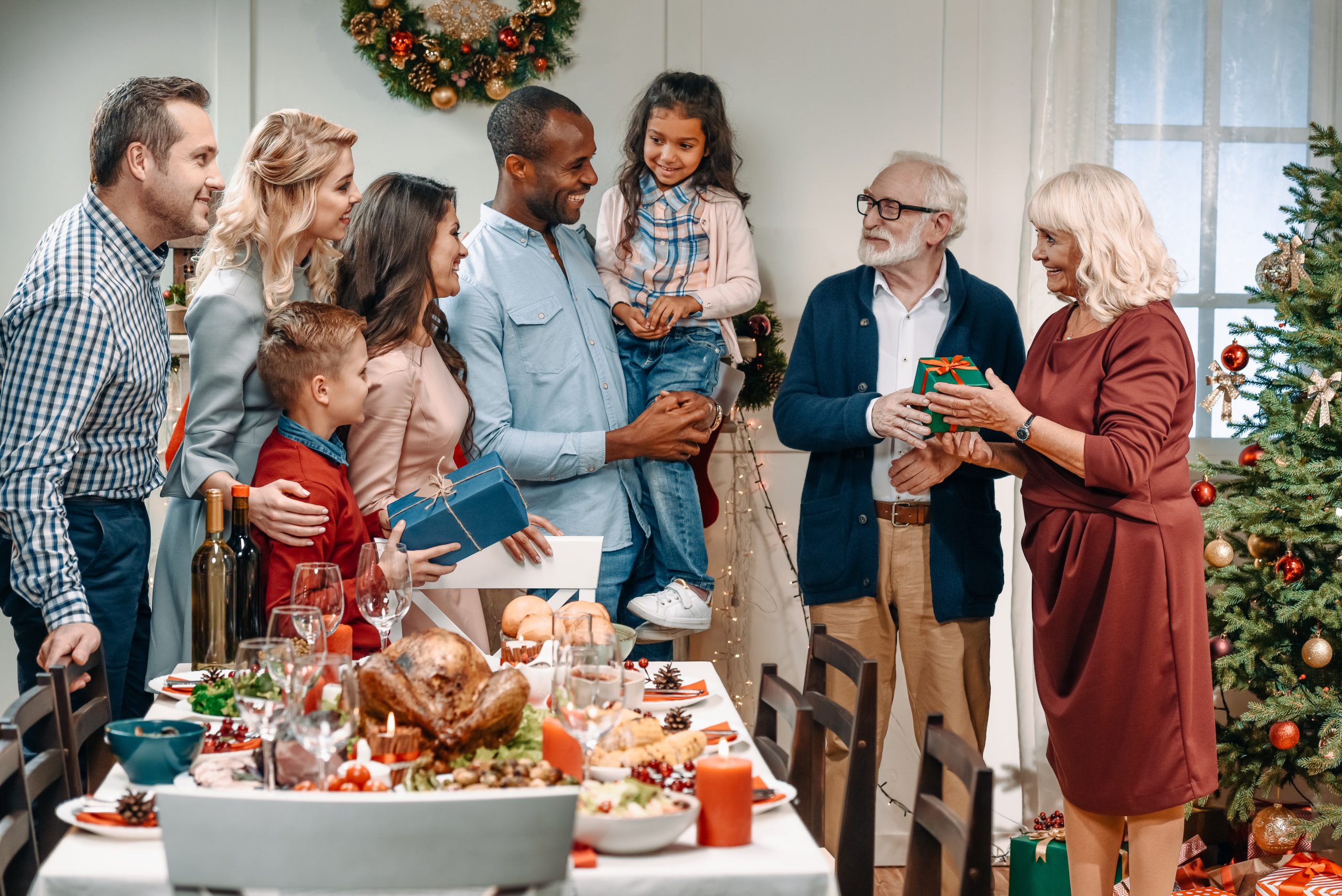Like most kids, I loved the standard traditions of Christmas—decorating Christmas cookies, caroling with family and friends, giving presents, and watching Christmas classics on TV. But in one way, Christmas at my house growing up always looked different, especially on Christmas Eve. That’s because my dad was Santa Claus. And that led to some unique Christmas traditions.
It all started over fifty years ago. As a favor to a family member, my dad donned the familiar red suit, and the tradition was born. By the time I was born, he had fully embraced his alter-ego, spending every December spreading holiday cheer to families in our community. And every Christmas Eve, we would alternate between joining him in the car as he made visits or waiting for him to return after a long night away from home.
As kids, we delighted in this personalized Christmas tradition. After all, who else could (and still can) boast a dad with a valid Idaho driver’s license under the name Santa Claus—with the restriction, of course, that it can only be used at night when driving a sleigh pulled by reindeer—legal credit and debit cards bearing the same name, and a license plate that read SANTA. For us, the thrill of the Christmas season revolved around the magic of this Christmas tradition.
Those fond memories remind me that Christmas traditions, whatever they look like, are important to our kids.
Why Are Traditions Important?
According to Donna Rockwell, licensed clinical psychologist, traditions, like those we celebrate at Christmas, make our kids better and stronger. She says, “It is during the holidays that our unique cultural traditions have the greatest potential to help in this process of self-definition, to contribute to well being, and to cultivate an all-important sense of belonging and a healthy perspective of our place in the world.” She further explains, “Our traditions act as a compass for all of our human relationships and personal interactions, the qualitative experiences of our family life, and ultimately, the development of civilized societies themselves.”
With all those benefits at stake, it’s worth exploring what traditions kids enjoy the most.
Favorite Christmas Traditions According to the Experts—Kids
As a full-time ninth grade teacher, I get to interact with teenage kids every day. Occasionally, when we have a break in the classroom action, we visit about random things. Recently, our conversation turned to favorite holiday traditions.
You might be tempted to think that cool ninth graders have outgrown the magic of holiday traditions. But there, my friend, you would be wrong. When I asked them to share some of their favorite Christmas traditions, their eyes lit up, their hands shot in the air, and I was bombarded with a variety of favorite traditions they were bursting to share.
Here are a few they described.
Traditions Involving Food
Many teens described Christmas traditions involving food. They shared ideas like:
· Preparing and eating cultural cuisine. Many families celebrate the holidays with traditional foods from their ancestral homelands. For example, one teen’s family, with roots in Sweden, makes a traditional Swedish meal on Christmas Eve. If you’re looking to add something new to your Christmas food list, consider researching your family history to discover what generations of family members before you ate at celebrations.
· Hosting a themed dinner. This one sounded especially fun to me. Every year, one family picks a theme for their Christmas Eve dinner. This year, they are celebrating Christmas “Little House on the Prairie” style.
· Decorating cookies or gingerbread houses. Several teens shared their love for the annual tradition of making gingerbread houses, especially when the activity turns into a competition. Others expressed joy at baking and decorating Christmas cookies to eat and share. In both cases, the act of creating these treats with others was the real tradition.
· Eating a traditional Christmas dinner. While some kids enjoy their big Christmas meal on Christmas Eve, others wait until Christmas day for the formal feasting. *Cue visions of the Whos down in Whoville as the Grinch carves the roast beast.
· Enjoying a big Christmas morning breakfast. In our house, Christmas breakfast is Dad’s domain. All the kids know that Dad will whip up a breakfast of champions to offset the abundance of Christmas candy.
Traditions Involving Activities
Other traditions focused on fun activities at Christmas. Some of these include:
· Swimming on Christmas Eve. This was a new concept for me. But apparently others have caught on because several students said their parents find pools that haven’t closed for the holidays and go on Christmas Eve. The brilliance of this idea hit me immediately, though, as I pictured exhausted children falling asleep quickly on the night before Christmas.
· Playing Christmas games. Among the favorites were white elephant exchanges, board games, and puzzles. Some kids especially enjoy the saran wrap ball game with small Christmas gifts. Here is an idea for a different kind of gift exchange involving candy bars.
· Skiing on Christmas Day. Living in a state that boasts the “greatest snow on earth,” it’s no surprise that many of the teens I know love to ski on Christmas.
· Opening Christmas advent calendars. Whether it’s the fan-favorite chocolate countdown calendar, one that is used year after year, or one you can fill yourself, counting down the days to Christmas can be a fun tradition for kids.
· Decorating the house. The varied responses I got on decorating made me laugh. While some kids said they enjoy decorating as a family, others said the decorating usually falls to mom—either because the kids don’t want to help or (more common) because mom likes to do it herself. But whichever way your family leans, it’s a tradition if you do it the same way year after year.
· Opening Christmas jammies on Christmas Eve. Some kids said they always have matching pajamas at Christmas while others said their pjs vary. But either way, they generally love the idea of jammies for Christmas.
Traditions Involving Stories
Most kids shared traditions involving stories of some kind. Here are some favorites:
· Reading stories to exchange gifts. Many of my students described the fun tradition of exchanging gifts with the left/right gift exchange. This fun game involves reading a favorite Christmas story and listening for key words that initiate passing gifts around the circle.
· Reading Christmas books. Many teens love to carry on their childhood tradition of reading favorite Christmas stories before bed. Seasonal classics like The Christmas Miracle of Jonathan Toomey and Why Christmas Trees Aren’t Perfect can be read in one sitting while longer favorites like Charles Dickens’ A Christmas Carol can be read throughout the month, a little at a time.
· Watching Christmas movies. You don’t have to read a book to enjoy a great story. One Christmas tradition most kids love is watching classic Christmas movies with family or friends. Some favorites include The Muppet Christmas Carol, The Year Without a Santa Claus, Elf, and How the Grinch Stole Christmas.
· Remembering the Nativity. One tradition many of my students shared was recounting the story of the birth of Jesus Christ as found in Luke 2 in the Bible. Some families act out this Christmas favorite while others read the account or watch it acted out on film. Regardless of the method, revisiting the story of the baby born in Bethlehem is a tradition many kids appreciate.
Traditions Involving Family
Most of the traditions we talked about revolved around family. Some traditions included immediate family members while others, when distance and time allowed, included extended family. These traditions include:
· Having a sibling/cousin sleepover on Christmas Eve. Many kids expressed joy at having a sleepover on Christmas eve. Some go to grandma’s house to camp out (indoors) with cousins while others sleep under the tree or in another designated room with their siblings on the night before Christmas.
· Hosting progressing family dinners. Again, this tradition works best when extended family members live nearby. So if you have a few uncles, aunts, cousins, or grandparents near, give every home an assigned part of a meal and caravan from house to house.
· Looking at Christmas lights. Several kids described piling into cars to view Christmas lights on Christmas Eve. You can extend this tradition to include viewing local light displays throughout the month of December.
· Giving and serving at Christmas. Many families enjoy giving to and serving others at Christmas.This can be a great tradition that helps your kids focus on the true meaning of Christmas.
· Connecting with distant family members at Christmas. Even if you don’t live near extended family, Christmas is a great time to connect. With all the possibilities of connecting with tech, Christmas can be a family affair from all around the world.
Carrying Traditions Forward
The magic of traditions, especially at Christmas, carries forward across generations, binding families with a sense of common purpose and love. Years after my own childhood experiences with my dad as Santa Claus, he gave that experience to my first child.
Our little family lived a 17-hour car ride away from my parents, celebrating our first Christmas far away from home. Imagine our surprise when, on Christmas Eve, Santa and Mrs. Claus (because my mom didn’t want to miss out on the fun) burst through our door to the delight of their first and only grandson.
The tradition my dad started years ago has trickled into my children’s lives in meaningful ways. Over the years they have cherished the unique tradition of knowing that grandpa is Santa Claus.
Consider your own traditions. If you have some good ones, keep them up. If you need to add some, try a few of those suggested above. They are important. They are shaping your kids’ holiday experience and their very lives.


